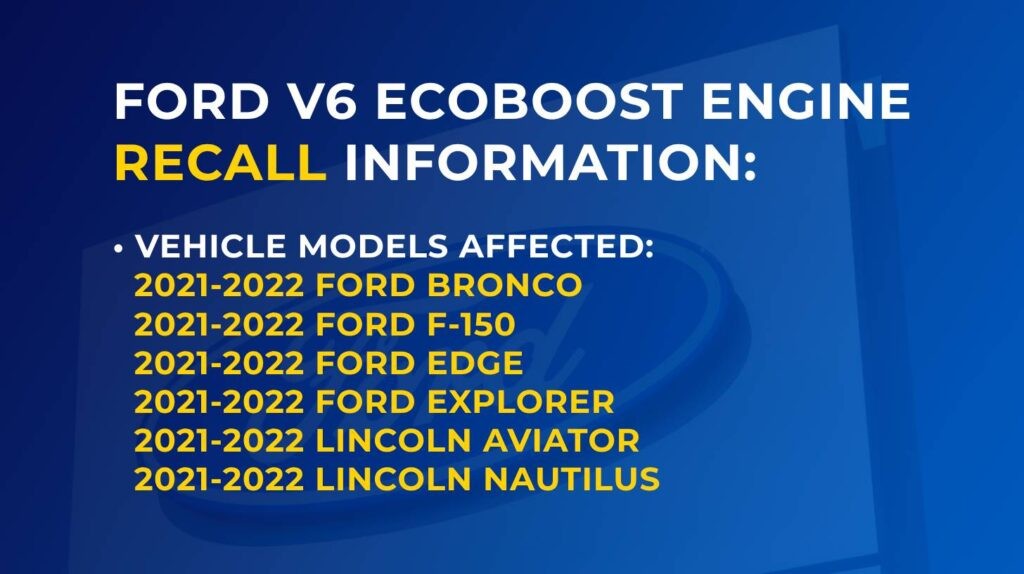If you’ve noticed unusual issues with your Ford vehicle’s performance, the 2024 Ford engine recall could be the reason. This significant recall is targeting a range of popular models, including the Ford F-150 and Ford Bronco, due to critical problems originating from the V6 EcoBoost engine. The core of the recall lies in defective engine intake valves, which can lead to abrupt engine failure, posing substantial safety hazards for drivers and passengers. It’s vital to understand the extent of this recall and how it affects your vehicle to ensure your safety and take appropriate action.
Which Ford and Lincoln Vehicles Are Recalled?
The Ford 2024 engine recall is not limited to just one model; it spans across several Ford and Lincoln vehicles equipped with the V6 EcoBoost engine. If you own one of the following models from the 2021-2022 model years, your vehicle might be affected:
- 2021-2022 Ford Bronco
- 2021-2022 Ford F-150
- 2021-2022 Ford Edge
- 2021-2022 Ford Explorer
- 2021-2022 Lincoln Aviator
- 2021-2022 Lincoln Nautilus
These vehicles, all equipped with either a 2.7L or a 3.0L Nano EcoBoost engine, are part of a massive recall affecting nearly 91,000 vehicles due to potential Ford EcoBoost engine problems. The Ford F-150 tops the list with the highest number of affected units at approximately 47,719. Following closely are the Bronco with about 15,835 vehicles and the Explorer with around 14,262. The Ford Edge has a smaller number of recalled vehicles, approximately 2,366. For Lincoln, the recall impacts roughly 7,199 Aviator SUVs and 3,355 Nautilus SUVs.
 Ford EcoBoost Engine Recall 2024 Models
Ford EcoBoost Engine Recall 2024 Models
Delving into the EcoBoost Engine Defect
The heart of the Ford Engine Recall 2024 is a defect within the V6 EcoBoost engine’s intake valves. These valves are crucial for the engine’s combustion process, and in the affected vehicles, they are prone to fracture.
The Root Cause of Intake Valve Failure
The issue stems from potentially faulty engine intake valves used in the Ford and Lincoln V6 EcoBoost engines. These critical components, essential for regulating air intake into the engine, may break and subsequently fall into the engine’s combustion chamber. This failure can lead to immediate and significant engine malfunction. Investigations have traced the problem back to inconsistencies in the quality of valve materials used in engines manufactured between May 1, 2021, and October 31, 2021.
Initially, issues were more apparent in Lincoln Aviator and Nautilus models. However, by 2023, the problem had extended, with 251 warranty claims reported for the 2021 Ford Bronco alone. By August 9, 2024, the total number of warranty claims related to fractured intake valves had alarmingly risen to 811 across the affected Ford and Lincoln models. This significant increase in reported failures prompted Ford and regulatory bodies like the National Highway Traffic Safety Administration (NHTSA) to take action. NHTSA even initiated a “Defect Petition” due to the growing number of customer complaints regarding the Ford Bronco engine recall and similar issues in other models.
It’s important to note that Ford implemented improvements to the valve materials after October 31, 2021. This suggests that vehicles produced after this date are less likely to be affected by this specific defect.
Understanding the Safety Risks of Engine Failure
A malfunctioning engine due to defective intake valves poses significant safety risks. The primary danger is a sudden loss of engine power while driving.
Potential Dangers for Drivers and Passengers
For drivers of Ford F-150 models experiencing engine problems from these defective intake valves, the most immediate risk is a sudden and unexpected loss of power. This can occur without warning, making vehicle control challenging, particularly in scenarios requiring immediate acceleration or maneuvering, significantly increasing the risk of traffic accidents.
Imagine driving on a busy highway and your vehicle suddenly decelerates or fails to accelerate when needed. Such situations can quickly become perilous, endangering both the driver and passengers. Furthermore, if an intake valve breaks, fragments can enter the combustion chamber, potentially causing severe internal engine damage. This could leave drivers stranded in potentially unsafe locations, far from assistance.
The Ford EcoBoost engine recall and related Lincoln engine defects highlight these serious safety concerns. It is crucial for owners to be vigilant for any signs of engine trouble and respond promptly to the recall notices.
Ford’s Recall Response and Corrective Measures
Ford has acknowledged the severity of the V6 EcoBoost engine defect and has initiated a comprehensive recall and repair program. The company is actively contacting owners of the affected vehicles to schedule free repairs at authorized Ford and Lincoln dealerships.
Ford’s Actions to Resolve the Engine Issue
To address the Ford V6 EcoBoost engine recall effectively, dealerships will conduct inspections to assess the engine cycle data of the recalled vehicles. Engines that fail this inspection will be replaced entirely, free of charge to the owner. Ford has also established a reimbursement plan to compensate owners who previously paid out-of-pocket for repairs related to this intake valve defect before the official recall announcement.
Ford notified dealerships about the recall on September 30, 2024, and began sending notification letters to vehicle owners starting October 7, 2024. This proactive approach by Ford aims to prioritize vehicle safety and rebuild customer trust.
Steps for Ford and Lincoln Owners Affected by the Recall
Owners of the vehicles listed in the Ford engine recall 2024 should take immediate action. The first step is to contact your local Ford or Lincoln dealer to schedule a service appointment for the recall repair.
Immediate Actions for Vehicle Owners
Mark October 7, 2024, on your calendar. This is the date when notification letters regarding the Ford F-150 engine recall and related recalls for other models began to be dispatched. Upon receiving your notification, promptly contact your local Ford or Lincoln dealership. Schedule an appointment to have your vehicle inspected and, if deemed necessary, have the engine replaced at no cost under the recall.
If you have already paid for repairs related to this issue before receiving the recall notice, ensure you inquire about Ford’s reimbursement program. You may be eligible to recover your expenses.
To stay informed about this and any future vehicle safety recalls, it is highly recommended to download the NHTSA SaferCar App or sign up for email alerts from NHTSA. Reporting any safety concerns you experience with your vehicle to NHTSA is also vital to ensure ongoing monitoring and prompt resolution of safety issues in the automotive industry.
Staying Updated on Future Recalls and Safety Notices
To remain informed about future recalls and safety updates, particularly concerning the Ford engine recall 2024 and other potential issues, vehicle owners should utilize reliable information resources. The National Highway Traffic Safety Administration (NHTSA) is a primary source for recall information and encourages drivers to report any safety-related concerns.
NHTSA offers resources like the SaferCar App and email alerts to keep you informed about new recalls as they are announced. Utilizing these services ensures you receive timely notifications regarding issues that may affect your vehicle’s safety and performance, not just for Ford but for all vehicle manufacturers. Staying proactive and informed is the best way to ensure your safety and the safety of others on the road.
NHTSA’s recent data indicates a positive trend with a 3.2% decrease in traffic fatalities in the first half of 2024 compared to 2023. This progress in road safety underscores the importance of continuous vigilance and utilizing NHTSA’s platforms for ongoing updates and recall alerts, ensuring safer driving conditions for everyone.
